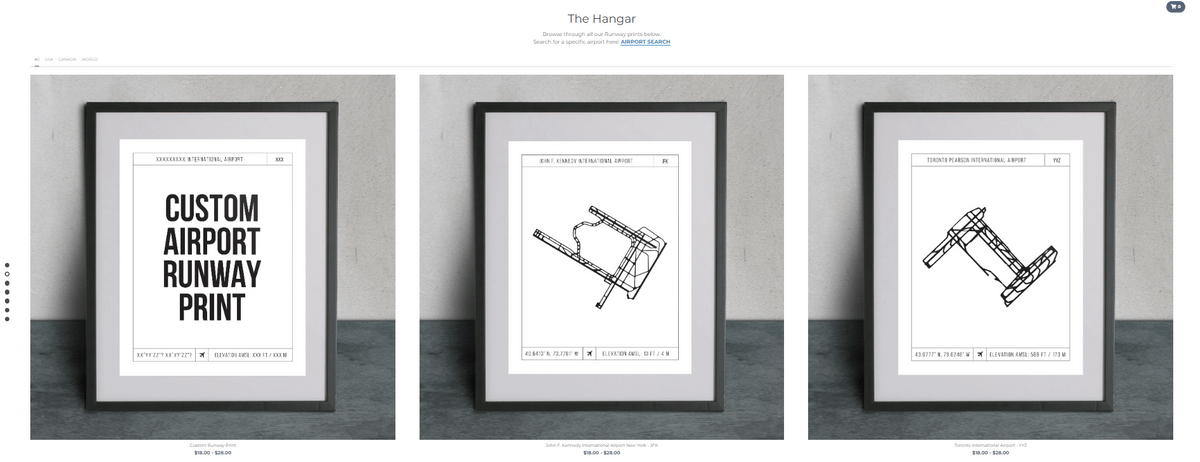Import Products: A Step-by-Step Guide For Small Businesses
Import Products: A Step-by-Step Guide For Small Businesses

Mastering how to import products can be a strategic move for small businesses, offering numerous benefits and opportunities for growth. In this step-by-step guide, we will explore the advantages of importing products, provide an overview, and emphasize the importance of choosing the right products.
Benefits of Importing Products for Small Businesses
Importing products opens up a world of possibilities for small businesses. It allows them to access a broader range of goods that may not be available locally, providing unique and competitive offerings to their customers. Small businesses can also benefit from cost savings through lower production costs or favorable exchange rates by learning how to import products.
When you import products, you can enhance a business's reputation by offering high-quality and diverse options to customers. It allows companies to tap into global trends and stay ahead. With careful planning and research, small businesses can find profitable niches to sell imported products and increase their revenue streams.
Importance of Choosing the Right Products to Import
Choosing the right products to import is crucial for small businesses seeking success in international trade. It requires careful consideration of market demand, competitor analysis, and identifying profitable opportunities. When you import products, you can maximize your chances of success by selecting popular or niche products that resonate with your target audience's preferences or fulfill unmet needs in your local market.
Importing products also involves evaluating factors such as quality, pricing, and reliability of suppliers. Learning how to import products is essential to conduct thorough research and due diligence to ensure that the products you import align with your business's values and meet customer expectations.
By strategically importing products and choosing the right items, small businesses can unlock new growth opportunities, expand their product offerings, and stay competitive in today's global marketplace. Now, let's dive into the step-by-step guide to importing products and explore each stage in detail.
When you import products for your small business, thorough research and planning are essential. This section will cover three critical aspects:
- Identifying market demand for imported products
- Conducting competitor analysis
- Setting a budget for importing products
1. Identifying Market Demand
Before diving into the world of how to import products, it's crucial to identify the market demand for the products you wish to import. Conduct market research to determine if there is a need or desire for these imported goods. Analyze consumer trends, preferences, and purchasing power in your target market.
By understanding the demand for specific imported products, you can ensure that your business offers what customers want. This knowledge will guide your product selection process and help you decide which items to import.
2. Conducting Competitor Analysis
Competitor analysis is vital in any business venture, including. Identify competitors already selling similar imported goods in your target market. Before you import products,study their pricing strategies, marketing tactics, and customer base.
When you import products, you can identify opportunities to differentiate yourself in the market by analyzing your competitors' strengths and weaknesses. Look for gaps or areas where you can offer unique value propositions or improve upon existing offerings. This analysis will help you develop a competitive advantage when selling imported products.
3. Setting a Budget
Importing products involves various costs, such as product sourcing, shipping fees, customs duties, storage expenses, and marketing expenses. It's crucial to set a realistic budget that considers all these factors.
Setting a budget will help determine if importing certain products is financially viable for your small business. It ensures that you clearly understand the costs involved and can make informed decisions about which products to import.
Finding Reliable Suppliers
Image taken from Beauty INU
When it comes to importing products, finding reliable suppliers is crucial for the success of your small business. Here are the steps you need to take to ensure you choose the suitable suppliers and manufacturers.
1. Researching Reputable Suppliers and Manufacturers
Conduct thorough research to identify reputable suppliers and manufacturers in your desired industry when mastering how to import products. Look for companies with a proven track record of delivering high-quality products and meeting delivery deadlines. Online directories, trade shows, and industry associations can be valuable resources for finding potential suppliers.
2. Evaluating Supplier Credibility and Reliability
Once you have a list of potential suppliers, evaluating their credibility and reliability is essential. Before you import products, always check their references and customer reviews to understand their reputation in the market. Look for certifications or accreditations that demonstrate their commitment to quality standards. Consider their financial stability and ability to handle your desired order volume.
3. Negotiating Favorable Terms and Pricing
After narrowing down your list of potential suppliers, it's time to negotiate favorable terms and pricing. Communicate your requirements, including product specifications, quantity, delivery timelines, and payment terms. Be prepared to deal with these aspects while considering the quality of the products you want to import.
Building a solid relationship with your suppliers is essential for long-term success. Establish open lines of communication and maintain regular contact with them throughout the importing process.
Finding reliable suppliers is critical in successfully importing products for your small business. By conducting thorough research, evaluating credibility and reliability, and negotiating favorable terms, you can ensure that you partner with trustworthy suppliers who deliver high-quality products on time.
Now that we have covered how to find reliable suppliers,, let's move on to the next step in our guide: understanding import products regulations and customs.
Understanding Import Regulations and Customs
Image taken from Mantra
Importing products involves navigating various import regulations and customs procedures to ensure a smooth and compliant process. Familiarizing yourself with these regulations and laws is crucial to avoid legal issues or import delays.
1. Familiarizing with Import Regulations and Laws
To successfully import products, it is essential to understand the specific import regulations and laws of the country you are importing into. These regulations can vary widely, covering product safety standards, labeling requirements, and customs duties.
By researching and staying updated on these regulations, you can ensure that your imported products meet all requirements. This includes understanding any restrictions or prohibitions on certain types of products, such as restricted substances or controlled goods.
2. Completing Necessary Paperwork and Documentation
Importing products requires completing various paperwork and documentation to comply with customs requirements. This includes obtaining the necessary permits, licenses, certificates, and declarations for your imported goods.
Some standard documents that may be required include commercial invoices, packing lists, bills of lading or airway bills, certificates of origin, and import licenses. It is important to carefully fill out these documents accurately to avoid complications during customs clearance.
3. Working with Customs Brokers and Agents
Navigating through complex import regulations can take time and effort for small businesses. Working with customs brokers or agents can help streamline the process by providing expertise in customs procedures and documentation.
Customs brokers act as intermediaries between businesses and customs authorities, ensuring compliance with import regulations while facilitating smooth clearance of goods. They can assist in preparing the necessary paperwork, calculating duties and taxes, coordinating inspections if required, and handling any issues that may arise during the import process.
Strikingly is a platform that can help small businesses showcase and sell their imported products online. With its user-friendly interface and customizable templates, Strikingly allows businesses to create professional and attractive websites to promote their imported products. By leveraging Strikingly's features, small businesses can reach a wider audience and effectively market their imported products, increasing their chances of success in the competitive import market.
Shipping and Logistics
Image taken from Dr. Chai Tea
When importing products, one crucial step is planning and managing the shipping and logistics process carefully. This ensures that your imported products reach their destination promptly and cost-effectively.
1. Choosing the Appropriate Shipping Method
Choosing a suitable shipping method is essential for a successful importation process. Factors such as your products' nature, size, weight, and value should be considered when deciding on the most suitable shipping method. Options include air freight, sea freight, or land transportation. Each method has advantages and disadvantages regarding cost, speed, and handling requirements.
To make an informed decision, it's essential to research and compare different shipping options based on your specific needs. Consider factors such as transit time, reliability of carriers, insurance coverage, and any additional fees or restrictions that may apply.
2. Managing Transportation and Logistics
Managing transportation and logistics effectively is crucial once you have chosen the appropriate shipping method for your imported products. This involves coordinating with carriers or freight forwarders to ensure smooth handling of your goods from the point of origin to their final destination.
Key considerations include arranging pick-up or drop-off locations, tracking shipments in real-time using tracking numbers or online platforms provided by carriers or freight forwarders, coordinating customs clearance procedures at ports of entry, and managing any potential delays or disruptions that may arise during transit.
Having a clear communication channel with your suppliers can help streamline this process by providing them with accurate shipment details well in advance.
3. Dealing with Customs Clearance and Inspections
When importing products into a new country, dealing with customs clearance procedures is integral to the shipping process. Customs officials ensure compliance with import regulations and laws while inspecting goods for safety, quality control measures, and proper documentation.
To navigate this stage successfully:
- Familiarize yourself with import regulations and laws specific to the country you are importing into. This will help you understand the paperwork, permits, and licenses required for your products.
- Complete all necessary documentation accurately and promptly. This may include commercial invoices, packing lists, certificates of origin, and other relevant documents.
- Consider working with customs brokers or agents who specialize in import procedures. They can guide you through navigating complex customs requirements and help expedite clearance.
Remember to stay updated on any changes in import regulations or customs procedures to ensure compliance and avoid unnecessary delays or penalties.
By effectively managing shipping and logistics, small businesses can ensure that their imported products reach customers efficiently while minimizing costs and delays. Strikingly provides an excellent platform for showcasing and selling imported products online, allowing businesses to expand their reach and connect with potential customers worldwide.
Managing Inventory and Storage
Image taken from Pretty Olive Interiors
Managing inventory and storage is crucial to importing products for small businesses. It involves determining storage requirements, implementing effective inventory management strategies, and organizing and tracking imported products.
1. Determining Storage Requirements
When importing products, it is essential to determine the storage requirements based on the nature and volume of the goods. Consider factors such as size, fragility, temperature sensitivity, and shelf life of the products. This will help you choose the appropriate storage facilities or warehouses to keep your imported products in optimal condition.
2. Implementing Effective Inventory Management Strategies
To successfully manage imported products, it is essential to implement effective inventory management strategies. This includes accurately tracking stock levels, monitoring product expiration dates (if applicable), and implementing a first-in-first-out (FIFO) system to prevent spoilage or obsolescence.
Inventory management software can streamline these processes by providing real-time visibility into stock levels, generating automated alerts for low-stock low-stock or expiring products, and facilitating efficient order fulfillment.
3. Organizing and Tracking Imported Products
Organizing and tracking imported products is crucial for efficient operations. Categorize your inventory based on product type, SKU numbers, or any other relevant criteria that make sense for your business. This will enable easy retrieval of specific items when fulfilling customer orders.
Implementing a barcode or RFID system can streamline the process further by automating data capture during receiving, storing, and shipping activities. This not only saves time but also reduces human errors in tracking inventory.
Properly managing inventory and storage ensures accurate visibility of your stock levels. This enables you to fulfill customer orders promptly, avoid overstocking or stockouts, and ultimately maximize the profitability of your imported products.
By implementing effective inventory management strategies and organizing and tracking your imported products efficiently, you can streamline your operations and ensure smooth order fulfillment for your customers.
Remember, Strikingly is a platform that can help you showcase and sell your imported products online. With its user-friendly interface and customizable templates, you can create a stunning website to attract potential customers and boost your sales.
Marketing and Selling Imported Products
Image taken from Runway Prints
Importing products opens up new opportunities for small businesses to expand their reach and offer unique goods to customers. Developing a comprehensive marketing strategy, leveraging online platforms and marketplaces, and building solid relationships with potential customers is essential to market and sell imported products effectively.
1. Developing a Marketing Strategy
When you import products, having a well-defined marketing strategy is crucial. Start by identifying your target audience and understanding their needs and preferences. Conduct market research to gain insights into consumer behavior and trends related to the products you plan to import.
Next, create a compelling brand story highlighting your imported products' uniqueness and quality—craft persuasive messaging emphasizing the benefits of choosing your offerings over competitors. Utilize various marketing channels such as social media, email marketing, content creation, and influencer partnerships to reach your target audience effectively.
2. Leveraging Online Platforms and Marketplaces
The Internet has revolutionized businesses' operations, providing numerous opportunities for small businesses to sell imported products globally. Take advantage of platforms like Strikingly, an easy-to-use website builder designed to showcase and sell products online.
Create an attractive website that engagingly showcases your imported products. Use high-quality product images and detailed descriptions to entice potential customers. Optimize your website for search engines by incorporating relevant keywords for importing products throughout your content.
Additionally, consider listing your imported products on popular online marketplaces like Amazon or eBay. These platforms have a large customer base actively searching for unique goods worldwide.
3. Building Relationships with Potential Customers
Building solid relationships with potential customers is essential to sell imported products successfully. Engage with your target audience through social media channels like Facebook or Instagram by sharing product updates, behind-the-scenes content, customer testimonials, or exclusive promotions.
Offer exceptional customer service by promptly responding to inquiries, addressing concerns, and providing personalized recommendations. Encourage customer reviews and testimonials to build trust and credibility for your imported products.
Consider partnering with influencers or bloggers in your niche who can showcase and endorse your imported products to their followers. Collaborating with these influencers can help increase brand awareness and drive sales.
Small businesses can effectively market and sell imported products by developing a comprehensive marketing strategy, leveraging online platforms, and building relationships with potential customers. Embrace the opportunities importing products brings and use platforms like Strikingly to showcase your unique offerings to a global audience.
Providing Customer Support and Satisfaction
Image taken from The Project Nomad
When it comes to importing products, providing exceptional customer support is crucial for the success of your small business. By offering top-notch service, you can build trust with your customers and ensure their satisfaction with the imported products.
1. Offering Exceptional Customer Service for Imported Products
To provide outstanding customer service, it's essential to have a dedicated support team knowledgeable about the imported products you sell. They should be well-trained in addressing customer inquiries, resolving issues, and providing product recommendations.
You can ensure your customers feel valued and supported throughout their purchasing journey by offering prompt and friendly assistance. This can lead to increased customer loyalty and positive word-of-mouth referrals.
2. Addressing Customer Concerns and Inquiries
Imported products may occasionally come with unique challenges or concerns. Before you import products, addressing these promptly and effectively to maintain customer satisfaction is essential.
Respond promptly with clear and helpful information when customers ask questions or concerns. Whether regarding product specifications, shipping updates, or return policies, ensure your support team is equipped to handle any inquiries professionally.
3. Ensuring Product Quality and Satisfaction
One of the critical aspects of providing exceptional customer support for imported products is ensuring their quality and satisfaction. Conduct thorough quality control checks on all incoming shipments to verify that the products meet your standards before selling them.
If a customer receives a defective or unsatisfactory product, have a transparent process for returns or exchanges. Make it easy for customers to communicate their issues and offer solutions that exceed their expectations.
When learning how to import products, always remember that satisfied customers are more likely to become repeat buyers and recommend your business to others. You can build long-term customer relationships by prioritizing excellent customer support throughout the importing process.
Build Your Business Website With Us!
Importing products can be a lucrative venture for small businesses. Following the step-by-step guide outlined above, companies can successfully navigate importing products and reap the benefits. Each step ensures a smooth importing process, from identifying market demand and finding reliable suppliers to understanding import regulations and customs.
Importing products allows small businesses to access a broader range of goods at competitive prices, giving them a competitive edge in the market. It also allows companies to expand their product offerings and cater to diverse customer preferences.
One platform that can significantly assist small businesses in showcasing and selling imported products online is Striking. With its user-friendly interface and customizable templates, Strikingly enables businesses to create visually appealing websites that effectively highlight their imported products. By leveraging this platform, small businesses can reach a larger audience and increase their sales potential.
Learning how to import products opens up new possibilities for small businesses. By carefully planning and executing each step of the import process, companies can successfully bring high-quality goods from around the world and offer them to their customers. With determination, research, and strategic decision-making, importing products can be profitable for small businesses.
Want to build a powerful website? Chat with us today!






